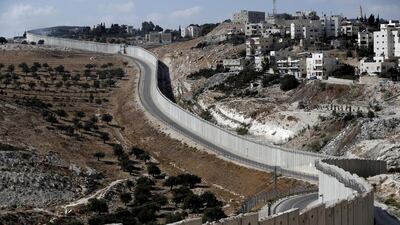Tom Barrack has been one of US president Donald Trump's biggest supporters from the start of his campaign. Of Lebanese descent, the founder of the private equity firm North Star continued his defence of Mr Trump's policies in Abu Dhabi last month during the first Milken Institute Middle East summit. For Mr Barrack, Mr Trump's seemingly irrational diplomatic manoeuvres belie strategic thinking that is changing the world for the better.
Mr Barrack argued that Mr Trump's ban on citizens from several Muslim countries had somehow brought the Muslim world together. The evidence for this statement was the historic 2017 Riyadh summit in which the US president met with leaders and representatives of 55 Arab and Muslim countries in Saudi Arabia.
Mr Trump's defenders in the United States and around the world are increasingly warming to the idea that the president's irrationality is actually a sign of brilliance – especially when it comes to his decisions on the Israeli-Palestinian conflict. At the conservative CPAC conference last week, the president reaffirmed his commitment to moving the US embassy to Jerusalem. To add insult to injury for the Palestinians and the rest of the Arab world, the embassy will be moved on Israel's independence day, which Palestinians call the nakba or catastrophe.
How did we reach this point in the conflict? In Ernest Hemingway's class novel The Sun Also Rises, one character is asked how he went bankrupt. "Gradually, then suddenly", the character responds. The same can be said about Israel's occupation of Palestinian land. Throughout the Oslo years, when both sides were supposed to be working out the details of self-government for a Palestinian state, Israel entrenched its occupation with relentless dedication.
Existing settlements were expanded while land was siphoned off throughout the West Bank for military firing zones and "security perimeters" around settlements. The Israeli separation wall barely followed the contours of the 1967 armistice line, and instead penetrated deep into the West Bank. Everything on the Israeli side became de facto Israeli territory.
The illusion of peace talks continued as this land grab accelerated and nowhere was this naked theft on greater display than in Jerusalem. Israel expanded Jewish settlements to encircle the old city. In Palestinian neighbourhoods such as Sheikh Jarrah and Silwan, Israeli settlers would purchase or occupy a house, protests would ensue, and the Israeli border police would crush local dissent, paving the way for more settlers to move in. As the years pressed on, Israel established a ring of settlements throughout Jerusalem, all the while making residency difficult to maintain for Palestinians through a Kafkaesque list of requirements and provisions. The formula hasn't changed much since 1967: remove as many Palestinians as possible through nearly impossible residency requirements and the deprivation of quality municipality services while populating Palestinian neighbourhoods with Israeli settlements.
But it wasn’t all naked aggression and occupation. The Jerusalem municipality has recently invested in professional branding campaigns that cast it as a dynamic and welcoming city for tourists. A tram line connecting East and West Jerusalem drew the attention of urban planners from around the world. The Jerusalem Marathon is now a marquee event, attracting thousands of international runners. The art scene is thriving along with the opening of several international hotel chains.
The problem with the branding campaign and events like the Jerusalem Marathon are that they treat the city as if it was unified. Unbeknown to several runners, the marathon route enters occupied Palestinian land. The tram is a physical representation of Israeli unification as it travels deep into occupied territory.
With this picture of Jerusalem in mind, how does Mr Trump’s decision to move the US embassy to Jerusalem affect life on the ground or even prospects for peace? The answer is not much. The occupation of Jerusalem has been ongoing for decades. Israel has used the peace process to advance its goals of uniting Israeli rule for all the land from the Mediterranean Sea to the Jordan River. The embassy decision only serves to show Israel’s leaders and the country’s population that no one is going to stop them from this occupation.
As for Mr Trump, his decision likely has little to do with his own beliefs on the conflict; nor does he actually believe he will kick-start a peace deal as a result of removing the most important final status issue from the negotiating table. This move is all about domestic US politics and his ability to raise enough political funds to fend off a full-scale Democratic attack in this year’s midterm elections and the presidential election in 2020.
Shortly after Mr Trump announced that the embassy would move on nakba day, the New York Times reported that casino mogul and staunch pro-Israel supporter Sheldon Adelson was considering paying for the move. Some in the diplomatic corps are concerned Mr Adelson is attempting to buy the ability to craft American foreign policy. They are right, but too late. Mr Adelson has already secured that power and will likely use his roughly $40 billion fortune to support Mr Trump and the Republicans in their upcoming election battles as a direct result of this Jerusalem decision. This is not strategic thinking, as Mr Barrack so eloquently argues, it is simple election year politics for a desperate politician and party.

